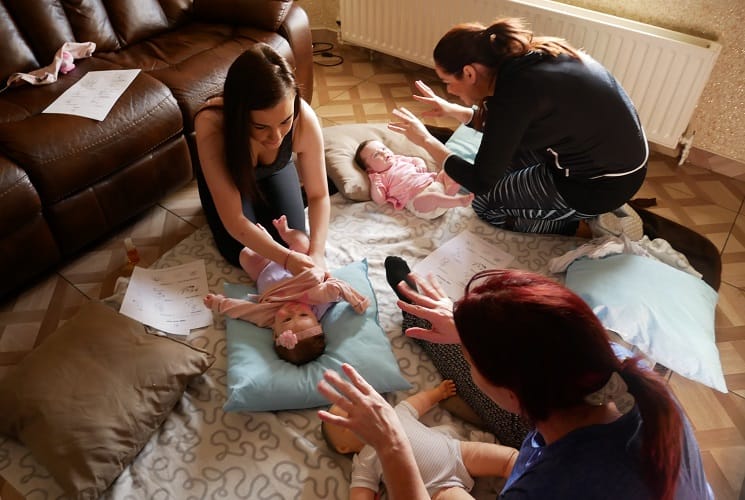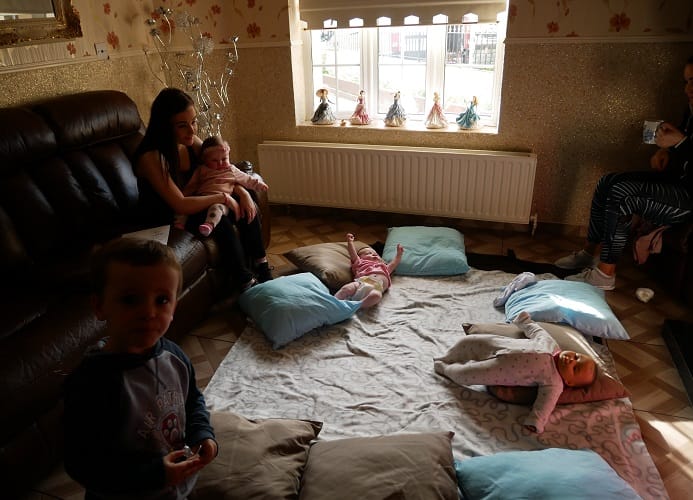What’s the best way to tell area residents about plans for a new asylum shelter nearby?
The government should tell communities directly about plans for new asylum shelters, some activists and politicians say.
Winnie Mc Donagh opens up her home to teach young Traveller mothers what she knows about baby massage.

Once a week, for five weeks, Winnie Mc Donagh has passed on what she has learnt.
“The strokes you learn from the pages, and it’s very relaxing,” she said on Wednesday morning, in her warm home, where the floor is scattered with cushions and a packet of cupcakes is open on the kitchen table.
“And it relaxes the mother,” she says.
Mc Donagh learnt how to run the baby-massage sessions on a four-day course in Leixlip, through her role as a healthcare worker at Pavee Point, the Traveller and Roma centre.
“I’m hoping after Christmas we’ll get more,” she says. “Because Travellers get married very young, and have babies at a very young age.”
This way, she can help support them a bit.
The baby massage helps with wind, and collic, and growing pains, says Mc Donagh. “It’s time out, and it’s touch, and the most important thing is the bonding between the mother and the baby.”

Mc Donagh has worked with children for years.
She has three of her own, and now a grandchild too. She used to volunteer at toddler groups and breast-feeding groups, and worked in a creche. “For a mother, that comes natural doesn’t it?” she said.
Now, as a health worker, she and others visit Traveller families in the area, around Blanchardstown and Finglas, helping them if needed, and letting them know what programmes they’re putting on.
They know who to stop by and see. “There’s women in it that’s there 30 years,” she says, of the group who make the rounds.
They make appointments, and go for check-ups, and remind women about smear tests, and keep an eye on those with diabetes, she says.
Or they drop off leaflets about programmes like this one.
The first session starts with three questions, says Mc Donagh: What’s your name? What’s your baby’s name? Why did you call them that?
It’s a way to get mothers relaxed, to start them talking.
It helps them to flag if some mothers have post-natal depression, but don’t realise – as she noticed with her own daughter. “Sometimes, if they think they’re alone, so you can get them involved in groups and things, you can chat,” she says.
Here, the kettle is on and the air is snug. “I don’t mind using my house. I’ve got the pillows and the cushions,” she says.
It’s within the Traveller site which makes it handier, says Brigid Collins, one of the mothers there for the class, who stayed overnight with her mother nearby. “If you have to travel outside the site, it’s very hard.”
Mc Donagh says that when her kids were growing up, she didn’t know about baby massage. “I appreciated the opportunity to do it with my grandchild.”
This Wednesday session is the last of this batch with two mothers and babies, of the massages, cups of tea and chats. “We’re going to relax today and give the certs,” says Mc Donagh.

“Right, we’ll get on the floor, we’ll start,” says Mc Donagh, who picks up a heavy doll with the weight of a real child.
“Would you like a massage? Would you like a massage?” says Collins, leaned over Mary, and smiling at her.
Mary giggles as her mother massages her legs; her face crumples with a tummy rub.
Mc Donagh reminds the mothers to make eye contact.
“Twist and glide, twist and glide,” says McDonagh, imitating the actions on the doll.
“And sun and moon,” they coo to the baby, as they go through the strokes.
“She sleeps better” after a massage, says Pauline Collins, as she holds Dakota on her knee.
The five-month old is docile and quiet, with a head of golden hair and a thick pink hairband. “I think she likes her legs,” says Collins. “[…] I do it myself now at home.”
Lots of mothering is functional, says Collins. “Usually, it’s just kind of a fixing her and putting her back down,” she says. “When you have two or three kids, it’s a bit more difficult to find time.”
So the baby massage means a bit of time out, a pause.
“The most important thing is that the mother and baby bonds,” says Mc Donagh. “That’s the most important thing.”
Mc Donagh says that her healthcare team is working to spread the word about the sessions, to reach others. “We’ll do it again after Christmas, for people who live in trailers and caravans.”
On the couch, Dakota rubs her eyes, and slumps further into her mother’s lap, closer to sleep.